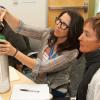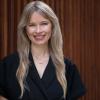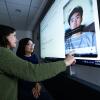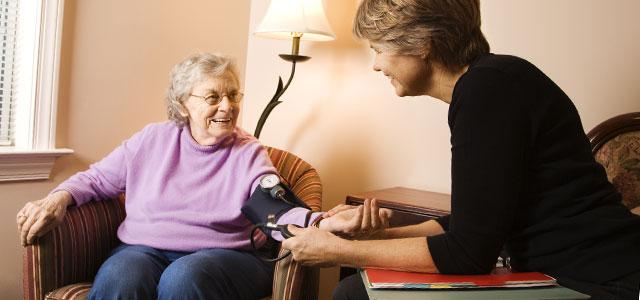
A Stronghold in the Care of Older Adults
To celebrate the 150th birthday of UC San Francisco and the role that the School of Nursing has played in this unique health sciences institution, Science of Caring is running a series of stories that focus on important, often seminal contributions that the School has made to health care delivery, education and research. For more than 30 years, the School has been a leader in research and education for the care of older adults.
Nearly 20 years ago, Jeanie Kayser-Jones, UC San Francisco School of Nursing professor emerita, devised a simple screening tool for nurses in nursing homes to use to evaluate the dental health of their elderly patients: a brief examination that enables nurses to catch worrisome symptoms that signal the need for a dentist.
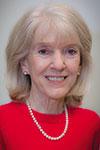 Jeanie Kayser-Jones To this day, interest in the assessment tool is strong, with hundreds of inquiries from nurses all over the world, says Kayser-Jones, the founding director of the School’s John A. Hartford Center of Gerontological Nursing Excellence and a renowned researcher in the care and safety of older adults. The tool, called the Brief Oral Health Status Examination, or BOHSE, is a great example of the significant impact nurses can have in geriatric care. “Oral health problems in older people can spiral downward, causing systemic infections, weight loss and other complications that lead to death,” says Kayser-Jones.
Jeanie Kayser-Jones To this day, interest in the assessment tool is strong, with hundreds of inquiries from nurses all over the world, says Kayser-Jones, the founding director of the School’s John A. Hartford Center of Gerontological Nursing Excellence and a renowned researcher in the care and safety of older adults. The tool, called the Brief Oral Health Status Examination, or BOHSE, is a great example of the significant impact nurses can have in geriatric care. “Oral health problems in older people can spiral downward, causing systemic infections, weight loss and other complications that lead to death,” says Kayser-Jones.
Kayser-Jones is proud of her personal contributions to the health of frail nursing home patients, but she’s also clearly proud of the contribution of gerontological nursing, a perspective and training that considers the whole patient and the multitude of interconnecting factors influencing health. She is among the many gerontological leaders who’ve helped make the School a historic force in the care of older adults, both in research and in clinical training.
Historic Force
“We are witnessing an aging demographic in the US, the need for clinicians is becoming more acute, and nurses and schools of nursing have an important role to play,” says Dean David Vlahov of the School. “One bold move has been the national effort to make sure that all those trained as adult nurse practitioners demonstrate knowledge and readiness to care for the elderly. We are fortunate here to have a solid core of researchers and educators in geriatric nursing and medicine to assure we have a first-rate education that is responsive to caring for this growing population.”
In fact, the School’s establishment of a geriatric nurse practitioner program in 1980, and its selection as one of the five initial Hartford Center programs in the country in 2000, set the stage from which many other important UCSF programs have emerged. For example, the Health Workforce Research Center, launched last year, is one of three federally funded national centers focusing on workforce issues related to the growing aging population. The Community Living Policy Center is a federally funded research and training project focusing on disabilities.
“UCSF is known for its strong interprofessional commitment to geriatrics and its robust community partnerships,” says Heather Young, an associate vice chancellor and dean of the Betty Irene Moore School of Nursing at UC Davis. “The Hartford Center came about because of the long-standing leadership in gerontological nursing by the faculty at UCSF, with a strong tradition of research, education and practice in improving the lives of older adults.”
Maintaining leadership in gerontological nursing has not always been easy, faculty are quick to point out. While the field attracts dedicated nurses passionate about improving the well-being of older adults, it also faces a roller coaster in funding, student popularity and teaching philosophy, linked, in part, to the evolving thinking about how best to prepare a workforce to care for the growing number of seniors. Investing in specialists versus more widespread gerontological training is a key debate. UCSF gerontological faculty remain a strong voice in national discussions and committed advocates for their field.
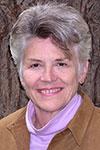 Carole Deitrich “It has been a struggle for the [medical] establishment to recognize that there is a need for special education and training to meet the complex needs of older adults and to understand aging,” says Carole Deitrich, professor emerita and former program director of the geriatric nurse practitioner (GNP) program, before it merged two years ago with the adult degree for one adult-gerontology primary care nurse practitioner (AGNP) specialty. “Advanced practice nursing education in gerontology at UCSF has been at the forefront of setting this standard,” she says.
Carole Deitrich “It has been a struggle for the [medical] establishment to recognize that there is a need for special education and training to meet the complex needs of older adults and to understand aging,” says Carole Deitrich, professor emerita and former program director of the geriatric nurse practitioner (GNP) program, before it merged two years ago with the adult degree for one adult-gerontology primary care nurse practitioner (AGNP) specialty. “Advanced practice nursing education in gerontology at UCSF has been at the forefront of setting this standard,” she says.
Changing demographics are driving growing attention on the need for geriatric skills. The US population of people age 65 and older is projected to grow from 13 percent of the overall population in 2010 to 19.7 percent in 2030, bringing with it increases in chronic and complex conditions, as well as disability.
How Gerontology Began at the School
The School’s commitment to gerontology solidified in 1980 when it received a major grant from the W.K. Kellogg Foundation to create a geriatrics-specific nurse practitioner program – one of five nursing schools in the nation to receive such funding.
The push at the time, says Deitrich, was to improve care in nursing homes by adding a layer of specialized training for nurses; Deitrich helped recruit the most promising of these nurses.
Under the grant, the newly trained geriatric practitioners were supposed to return to the nursing homes where they’d worked before, but their salaries didn’t necessarily increase with their advanced skills, and many were motivated to look for better-paid jobs, Deitrich adds.
Still, the program was popular with students. “Part of that was we still had some money to offer master’s students – state nurse traineeships,” says Deitrich.
The program started as a certificate and not a master’s degree, but when the Kellogg funding ended after five years, the School added the program to its master’s level curriculum, along with a gerontology clinical nurse specialist (CNS) master’s program.
The Hartford Hub
With the Kellogg clinical training program as a firm foundation, in 2000 the John A. Hartford Foundation selected the School as one of five initial centers in the nation to develop and prepare faculty as geriatric nurse leaders. Today, the UCSF/John A. Hartford Center of Gerontological Nursing Excellence is one of 13 centers nationwide. It offers pre- and postdoctoral scholarships and fellowships and mentoring, and serves as both a campus hub for nurses interested in the field and a research home to doctoral students interested in gerontology.
“It really is the core of the gerontological foundation of the school,” Deitrich says.
“It wasn’t until we got the Hartford Center that there was this pulling together, if you will, or nexus around which gerontology could coalesce. We had a cohort of people with the same interest,” says Meg Wallhagen, the center’s current director.
When word got out that the center was up and running, “It just caught hold, and everyone wanted to be in our doctoral program,” Kayser-Jones says. “It grew astronomically, and the financial support, vision and leadership of the John A. Hartford Foundation definitely gave it visibility and increased its status enormously.”
Interdisciplinary Vision
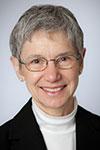 Meg Wallhagen The funding highs of the 1980s didn’t last. All of the Hartford centers are on considerably tighter budgets today, but the intent always was for them to become self-sufficient, Wallhagen says. Today, the center’s primary focus has shifted from faculty development to establishing a UCSF-wide gerontological center for experts from all four schools, essentially sharing resources and knowledge.
Meg Wallhagen The funding highs of the 1980s didn’t last. All of the Hartford centers are on considerably tighter budgets today, but the intent always was for them to become self-sufficient, Wallhagen says. Today, the center’s primary focus has shifted from faculty development to establishing a UCSF-wide gerontological center for experts from all four schools, essentially sharing resources and knowledge.
“We still have the commitment to [developing faculty],” Wallhagen says. “But we’re very much involved in an initiative to get faculty from across campus together a little more formally.”
This fits with the founding vision of the center, Kayser-Jones says. “As people get older, they often have [a more complex mix of] physical, psychological, social and cultural needs [than younger people]. Meeting these needs adequately requires an interdisciplinary team approach.”
Coping with Change
Two years ago, following a national trend, the gerontology nurse practitioner and gerontology clinical nurse specialist programs melded with the adult degree programs. The change, still controversial, was set in motion by the National Council of State Boards of Nursing, with the goal of having a larger nursing workforce prepared to care for adult patients for their entire lives, until death.
Many gerontology specialists are skeptical. “I worry that the geriatric part of it will be watered down. There’s only so much a person can learn in a couple of years,” Deitrich says. “You have to hope there will be enough of the geriatric spark that the person will want to take it into the future.”
Vlahov understands the concerns but thinks there is reason to believe the School will be able to continue to lead in ensuring that the training meets the needs of the nation’s aging population.
“The Hartford Center has been a historic and invaluable launching pad for this expanded version of geriatric training that is core to the overall direction of the School,” he says. “We are deeply appreciative of the groundwork that Jeanie Kayser-Jones and Meg Wallhagen have so carefully built, and not only are we developing a certificate and post-master’s curriculum for those who seek additional training in geriatric nursing, but we have developed a critical mass of 17 researchers in care of the elderly that spans three departments to address the acute and chronic care of the elderly, transitional care, healthy aging and aging in place. We also are fortunate to have a tight relationship with a highly effective and collaborative Division of Geriatrics [in the Department of Medicine] and a number of community agencies serving the elderly.”
Deitrich hopes that the aging population – as well as the draw many feel to working with this population – will also help sustain the specialty she spent much of her career helping to build.
“When I discovered geriatrics, I realized it was clinically and scientifically complicated, with complex physiological and diagnostic concerns, as well as the psychosocial aspects of the aging process,” Deitrich says. “You have to have tolerance for a high degree of ambiguity. You have to be able to put all of these things together. It’s very rewarding for this reason.”

